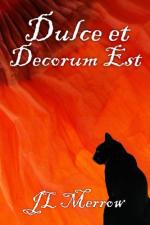|
This section contains 646 words (approx. 3 pages at 300 words per page) |

|
"Dulce Et Decorum Est"
Summary: An analysis of the poem "Dulce Et Decorum Est" by Wilfred Owen. Owen effectively utilizes a soldier as narrator, a morose tone, and certain poetic devices to help create the effect of fear of going to war.
In the poem, Dulce et Decorum Est written by Wilfred Owen, the speaker appears to be a soldier in the army, warning young people eager for war, "children ardent for some desperate glory," that war is not what it seems. The soldier explains to the reader through first hand experience that fighting for one's country is not as glorious a task as it may appear to be. One shouldn't believe the lie that is told about how it is sweet and proper to die for one's country. The poem takes place during a war, while the men are marching and death surrounds them. Throughout the length of the poem, the speaker has a morose tone, as anyone witnessing so much death and destruction around them would. By describing the horror surrounding him, the speaker is trying to convey that if one were to see what he has seen...
|
This section contains 646 words (approx. 3 pages at 300 words per page) |

|


